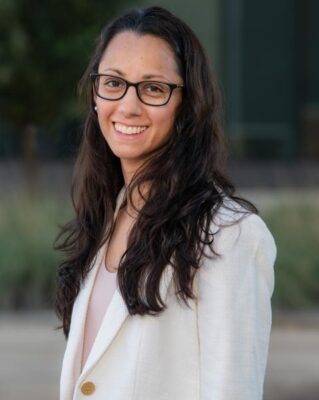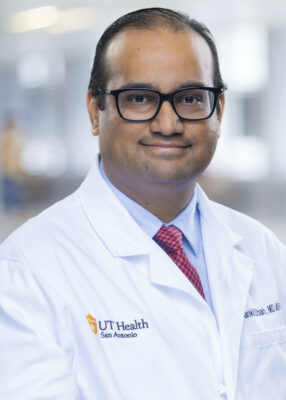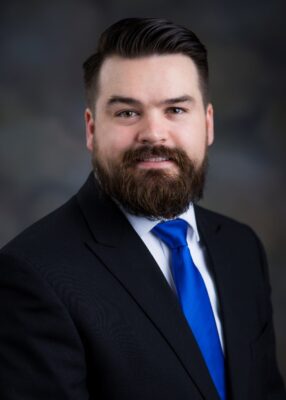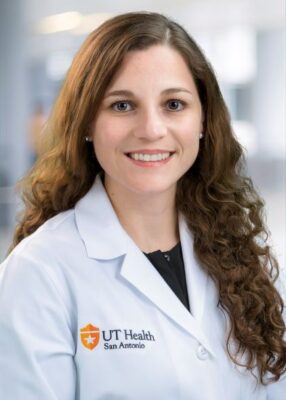Current Scholars
 Darlene Bhavnani, PhD, MPH is an Assistant Professor in the Department of Population Health and an infectious disease epidemiologist in the Biomedical Data Science Hub at Dell Medical School. Dr. Bhavnani earned her doctorate in epidemiology and Master of Public Health from the University of Michigan. She has over 10 years of experience in global health and has worked in academic, public, and nonprofit settings in Asia and Latin America. Dr. Bhavnani’s research will focus on examining racial and ethnic disparities in asthma among children in the United States through the lens of respiratory viral infections.
Darlene Bhavnani, PhD, MPH is an Assistant Professor in the Department of Population Health and an infectious disease epidemiologist in the Biomedical Data Science Hub at Dell Medical School. Dr. Bhavnani earned her doctorate in epidemiology and Master of Public Health from the University of Michigan. She has over 10 years of experience in global health and has worked in academic, public, and nonprofit settings in Asia and Latin America. Dr. Bhavnani’s research will focus on examining racial and ethnic disparities in asthma among children in the United States through the lens of respiratory viral infections.
 Neelam Mukherjee, Ph.D., Instructor, Dept. of Urology, received her bachelor’s and master’s in microbiology from University of Calcutta, India. She completed her Ph.D. in Cellular and Structural Biology in 2015 and pursued her postdoctoral training in bladder cancer immunology in the lab of Dr. Robert Svatek at UT Health San Antonio. Dr. Mukherjee is a cancer immunologist and her research interests involve the characterization of immune populations and the recruitment and activation mechanisms of these immune cells that contribute to effective anti-tumor responses. She wants to use this knowledge to improve the landscape of immunotherapy in cancer patients. During her KL2 years, Dr. Mukherjee will research chemokine signaling and effector cell mechanisms that help restrict bladder tumor growth and develop a novel immunotherapeutic strategy using a modified chemokine.
Neelam Mukherjee, Ph.D., Instructor, Dept. of Urology, received her bachelor’s and master’s in microbiology from University of Calcutta, India. She completed her Ph.D. in Cellular and Structural Biology in 2015 and pursued her postdoctoral training in bladder cancer immunology in the lab of Dr. Robert Svatek at UT Health San Antonio. Dr. Mukherjee is a cancer immunologist and her research interests involve the characterization of immune populations and the recruitment and activation mechanisms of these immune cells that contribute to effective anti-tumor responses. She wants to use this knowledge to improve the landscape of immunotherapy in cancer patients. During her KL2 years, Dr. Mukherjee will research chemokine signaling and effector cell mechanisms that help restrict bladder tumor growth and develop a novel immunotherapeutic strategy using a modified chemokine.
 Pankil Shah, MD, PhD, CPHQ is an Assistant Professor in the Long School of Medicine, UTHeatlh San Antonio. He is an epidemiologist and data scientist focusing on utilizing big data generated from electronic medical records (EMR), omics (gene expression, microbiome, metabolome), and population-level databases, for predictive risk modeling to develop evidence-based precision medicine and public health strategies. He received medical training from Seth GS Medical College & KEM Hospital, Mumbai, India and epidemiology and biostatistics training from UTHealth Houston School of Public Health. His KL2 research focuses on development of diagnostic and prognostic algorithms using artificial intelligence (computer vision and machine learning) to predict the clinical trajectory of patients with cancer at risk of developing long-COVID (post-acute sequalae of SARS CoV-2). This analytic approach combines clinicopathologic, radiomics, and deep learning and can be applied to a broad range of risk-stratification challenges aimed to improve cancer survivorship. The project goal is to integrate the validated algorithms into EMR to facilitate clinical decision making. Dr. Shah aims to establishing an independent research program at the cross-roads of precision medicine and ML/AI with a focus on cancer survivorship.
Pankil Shah, MD, PhD, CPHQ is an Assistant Professor in the Long School of Medicine, UTHeatlh San Antonio. He is an epidemiologist and data scientist focusing on utilizing big data generated from electronic medical records (EMR), omics (gene expression, microbiome, metabolome), and population-level databases, for predictive risk modeling to develop evidence-based precision medicine and public health strategies. He received medical training from Seth GS Medical College & KEM Hospital, Mumbai, India and epidemiology and biostatistics training from UTHealth Houston School of Public Health. His KL2 research focuses on development of diagnostic and prognostic algorithms using artificial intelligence (computer vision and machine learning) to predict the clinical trajectory of patients with cancer at risk of developing long-COVID (post-acute sequalae of SARS CoV-2). This analytic approach combines clinicopathologic, radiomics, and deep learning and can be applied to a broad range of risk-stratification challenges aimed to improve cancer survivorship. The project goal is to integrate the validated algorithms into EMR to facilitate clinical decision making. Dr. Shah aims to establishing an independent research program at the cross-roads of precision medicine and ML/AI with a focus on cancer survivorship.
 Mbemba Jabbi, Ph.D., is an assistant professor of the Department of Psychiatry and Behavioral Sciences at Dell Medical School. Jabbi graduated with combined Bachelor of Science and Master of Science degrees in experimental psychology and neuroanatomy from the University of Groningen, Netherlands, in 2002 and obtained a doctorate in clinical neuroscience from the University Medical Center Groningen in 2007. Prior to joining Dell Medical School, Jabbi did a Fogarty International Visiting Postdoctoral Fellowship at the U.S. National Institutes of Health in Bethesda, Maryland, from 2007 to 2011. He then completed his research fellowship at the National Institute of Mental Health in Bethesda in 2016. There, Jabbi lead the translational multicenter studies looking at how rare but penetrant genetic events influence affective processes. Jabbi’s current research applies deep behavioral phenotyping and multimodal imaging genetics to better understand the neurogenetic basis for normal and dysregulated affective functioning. His lab seeks to contribute to the integrative characterization of how genes affect brain circuitry mediation of basic and higher-order adaptive affective functions. Jabbi’s long-term goal is to further use the insights gained from these studies to guide novel strategic identification of neurogenetic biomarkers for maladaptive affective dysfunctions.
Mbemba Jabbi, Ph.D., is an assistant professor of the Department of Psychiatry and Behavioral Sciences at Dell Medical School. Jabbi graduated with combined Bachelor of Science and Master of Science degrees in experimental psychology and neuroanatomy from the University of Groningen, Netherlands, in 2002 and obtained a doctorate in clinical neuroscience from the University Medical Center Groningen in 2007. Prior to joining Dell Medical School, Jabbi did a Fogarty International Visiting Postdoctoral Fellowship at the U.S. National Institutes of Health in Bethesda, Maryland, from 2007 to 2011. He then completed his research fellowship at the National Institute of Mental Health in Bethesda in 2016. There, Jabbi lead the translational multicenter studies looking at how rare but penetrant genetic events influence affective processes. Jabbi’s current research applies deep behavioral phenotyping and multimodal imaging genetics to better understand the neurogenetic basis for normal and dysregulated affective functioning. His lab seeks to contribute to the integrative characterization of how genes affect brain circuitry mediation of basic and higher-order adaptive affective functions. Jabbi’s long-term goal is to further use the insights gained from these studies to guide novel strategic identification of neurogenetic biomarkers for maladaptive affective dysfunctions.
 Casey Straud, PsyD, is an Assistant Professor and licensed clinical psychologist with the Department of Psychiatry and Behavioral Sciences. He also holds a joint appointment within the Department of Psychology at University of Texas at San Antonio. His research interests are on the etiology, pathology, and treatment of posttraumatic stress disorder (PTSD), and factors that impact treatment response. He completed his doctoral degree at Nova Southeastern University and his pre-doctoral internship at the Pittsburgh VA Healthcare System. He completed a two-year postdoctoral clinical research fellowship at the University of Texas Health Science Center at San Antonio in collaboration with South Texas Research Organizational Network Guiding Studies on Trauma and Resilience (STRONG STAR) and the Consortium to Alleviate PTSD (CAP). During his fellowship, he was involved in planning, conducting, analyzing, and disseminating results of randomized clinical trials of cognitive behavior therapy for combat-related PTSD. Dr. Straud will continue his line of research dedicated to PTSD treatment outcomes over the KL2 period. His research project will focus on examination of biological and pharmacological mechanisms to improve current first-line behavioral treatments for PTSD.
Casey Straud, PsyD, is an Assistant Professor and licensed clinical psychologist with the Department of Psychiatry and Behavioral Sciences. He also holds a joint appointment within the Department of Psychology at University of Texas at San Antonio. His research interests are on the etiology, pathology, and treatment of posttraumatic stress disorder (PTSD), and factors that impact treatment response. He completed his doctoral degree at Nova Southeastern University and his pre-doctoral internship at the Pittsburgh VA Healthcare System. He completed a two-year postdoctoral clinical research fellowship at the University of Texas Health Science Center at San Antonio in collaboration with South Texas Research Organizational Network Guiding Studies on Trauma and Resilience (STRONG STAR) and the Consortium to Alleviate PTSD (CAP). During his fellowship, he was involved in planning, conducting, analyzing, and disseminating results of randomized clinical trials of cognitive behavior therapy for combat-related PTSD. Dr. Straud will continue his line of research dedicated to PTSD treatment outcomes over the KL2 period. His research project will focus on examination of biological and pharmacological mechanisms to improve current first-line behavioral treatments for PTSD.
 Maria “Sukie” Rayas, MD, is an Assistant Professor in the Department of Pediatrics, Division of Endocrinology and Diabetes. Dr. Rayas received her Bachelor of Science in Psychology from Washington and Lee University and completed her medical school, residency, and fellowship training at the University of Texas Health San Antonio. She was awarded the 3-year ENVISION grant by the Cystic Fibrosis Foundation in 2016 to support her career path as a cystic fibrosis (CF) endocrine specialist. Her recent research efforts have focused on evaluating the contribution of liver disease to diabetes in CF. Her KL2 research will utilize dual glucose tracers and hyperglycemic clamp methodology to identify alterations in the gut-pancreas axis in CF. Her research will also determine the effect of macronutrient composition on glucose kinetics and islet function in individuals with CF. Dr. Rayas’ overall long-term career goal is to become an independent physician-scientist whose research elucidates the pathogenesis to diabetes development in CF in an effort to improve screening, diagnosis, and treatment practices.
Maria “Sukie” Rayas, MD, is an Assistant Professor in the Department of Pediatrics, Division of Endocrinology and Diabetes. Dr. Rayas received her Bachelor of Science in Psychology from Washington and Lee University and completed her medical school, residency, and fellowship training at the University of Texas Health San Antonio. She was awarded the 3-year ENVISION grant by the Cystic Fibrosis Foundation in 2016 to support her career path as a cystic fibrosis (CF) endocrine specialist. Her recent research efforts have focused on evaluating the contribution of liver disease to diabetes in CF. Her KL2 research will utilize dual glucose tracers and hyperglycemic clamp methodology to identify alterations in the gut-pancreas axis in CF. Her research will also determine the effect of macronutrient composition on glucose kinetics and islet function in individuals with CF. Dr. Rayas’ overall long-term career goal is to become an independent physician-scientist whose research elucidates the pathogenesis to diabetes development in CF in an effort to improve screening, diagnosis, and treatment practices.

